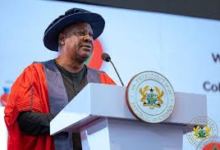
The Minister of Trade and Industry, Mr Alan Kwadwo Kyerematen has urged African countries to develop a national programme of action to harness the benefits of the African Continental Free Trade Area (AfCFTA), which kick-starts on January 1, 2021.
According to him, even though the AfCFTA promises a lot of benefits, it would require the efforts of the individual member states to harness these benefits, stressing that “Whilst acknowledging the benefits to be gained from the AfCFTA, it is worth noting that these benefits will not accrue automatically.”
Mr Kyerematen made the call at the official inauguration and handing over of the AfCTA secretariat in Accra, yesterday.
The secretariat is expected to commence operations ahead of the official implementation of the AfCFTA agreement in January, 2021.
The minister explained that the successful implementation of the initiative would bring many benefits to the continent, which included increase in the level of intra African trade through better harmonisation and coordination of trade within the continent.
“It is estimated that intra African trade will increase by as much as 35 billion US dollars per annum or 52 per cent by 2022. Secondly, it will address the challenge of small fragmented markets in Africa by creating a single continental market which will lead to economies of scale,” he added.
Mr Kyerematen said the operationalisation of AfCFTA would add value to Africa’s abundant natural resources and promote economic diversification and industrialisation, in addition to promoting the development of regional value chains and facilitate cross border investments in Africa.
He said “it will open up market access opportunities for SMEs in Africa on preferential trade terms. With a population of 1.2 billion, estimated to reach 2.5 billion by 2050, Africa will become a very attractive destination for Foreign Direct Investment because of its market size, with the potential for joint ventures and enhanced local content,” he emphasised.
Mr Kyerematen said the effective implementation of free trade on the continent would require sustained political will and commitment from the highest level of executive authority in each country, in respect of providing adequate budgetary resources to support the growth and development of priority sectors.
He said it would also require creation of the appropriate incentive and regulatory framework to attract investments from the private sector, both domestic and foreign.
“At the national, regional and continental levels, the need to develop modern trade related infrastructure, including multi modal transport infrastructure to improve connectivity, cannot be overemphasised,” Mr Kyerematen said.
The Secretary General of AfCFTA, Mr Wamlele Keabetswe Mene, said the AfCFTA offered Africa an opportunity to confront the significant trade and economic development challenges that confronted it.
He explained that the bane of the continent’s development could partly be attributed to the high levels of market fragmentation, small national economies, over reliance on the export of primary commodities and the narrow export base caused by shallow manufacturing capacity among others.
“The result of all of this, is a very low percentage of intra-Africa trade of 18 per cent, and as noted, an over reliance on the export of primary commodities to traditional markets of the North,” he stressed.
Mr Mene said the AfCFTA signalled Africa’s openness for business and mutually beneficial investment, which would create decent jobs and improve livelihoods.
“We have a market of 1.2 billion people; we have a combined GDP of US$3.4 trillion; Africa boasts over 400 African companies that earn annual revenues of US$1 billion or more,” he said.
By Cliff Ekuful& Yaw Kyei







